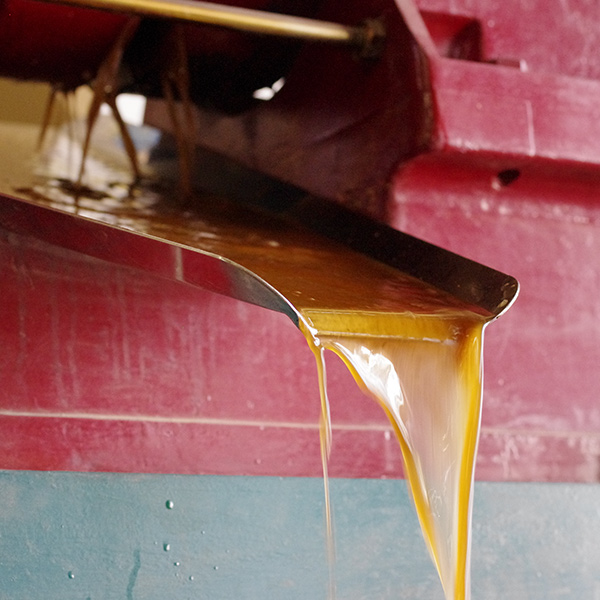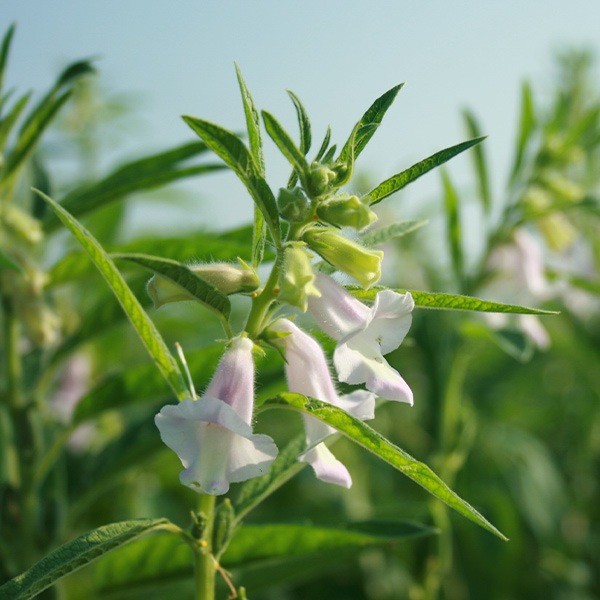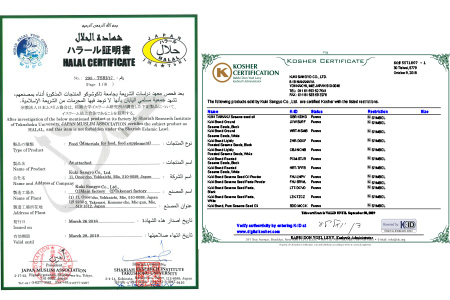WHY KUKI ?
We provide delightful, safe products to the world with special care and attention to taste and quality.

Traditional Manufacturing Method with No Chemicals.
Kuki has not changed our fundamental method of manufacturing sesame oil since our establishment in 1886. We begin by strictly inspecting raw ingredients for quality, and then proceed to compress these ingredients by our “pressing method” which does not use any chemicals in order to extract the fragrant sesame oil. Afterwards, the oil is placed in a tank where it remains still for about two weeks. It is then repeatedly filtered with cloth and filter paper. This entire process about one and a half months from start to finish. The traditional compression method takes time and effort, but it is the only method to create the highest quality sesame oil. The same thoughts and deliberation for taste and quality also appear in the manufacturing process of sesame pastes. The sesame peeling process is not treated with chemicals, and it is carefully completed by rubbing the sesame seeds together to remove the hull. This also takes significant time and effort, but the finished flavor will be completely different from any other process. While maintaining our traditional manufacturing methods, our policy is to also incorporate the latest technologies available. We have installed equipment that is appropriate and innovative to raise our product quality to even higher levels. Our corporate philosophy is to always be thinking how to be one step ahead of the rest.

Pesticide Residue Inspection for 30 Years and Counting.
Our company has been conducting pesticide residue inspections beginning more than 30 years ago. Most raw materials for sesame seed products in Japan are imported from overseas. Sesame cultivation overseas is generally grown without using pesticides, but taking careful consideration based on past occurrences and experiences, we have learned to strictly check certain items that have a higher chance of having residue or chemical contamination. In order to make the taste and quality consistent, we blend raw sesame seeds imported from various countries including those in Asia, Africa, Central and South America, and control the roasting temperature, roasting time, and we always are aiming to provide the same delicious tasting sesame seed products. All raw materials are carefully inspected for taste, and thanks to the highly skilled craftsmen at Kuki, the consistent taste of our delicious sesame is born.

Acquisition of international standard ISO 22000 and FSSC 22000 certification.
In October 1999, Kuki obtained ISO 9001 certification for product quality standards. Amid a growing interest in food safety and security, we formed a project team in 2006 to pursue further safety compliance and acquired ISO 22000 certification. In February of 2008, by the authorization of the Japan Management Association we were certified for ISO 22000:2005, which in 2012 became known as FSSC 22000 when food safety standards were updated. In 2017, we were certified for the JFS-C standard (as of October 31, 2018, the GFSI approved this as an international standard), making us the very first certified domestic oil manufacturer and sesame processing maker in Japan. We have established a clear system for food safety in all our processes starting from the acceptance of raw materials to the final delivery of our products to our customers.

Acquisition of Halal and Kosher Certification.
In March 2015, in order to allow customers that come from many different religious backgrounds to enjoy our sesame products safely, Kuki established itself as the very first company in the Japanese sesame seed industry to achieve HALAL (*1) certification for almost all our products (sesame oil, roasted/ground sesame, and sesame paste). In addition, a portion of our products have also been certified for those of the Jewish faith as KOSHER (*2). With the aim of further global expansion, we will continue our efforts to ensure that people from all over the world can enjoy delicious sesame products from Kuki.
(*1) HALAL certification meets Islamic teachings (obtained from the Religious Organization Japan Muslim Association).
(*2) KOSHER certification is to be recognized as satisfying Jewish precepts.